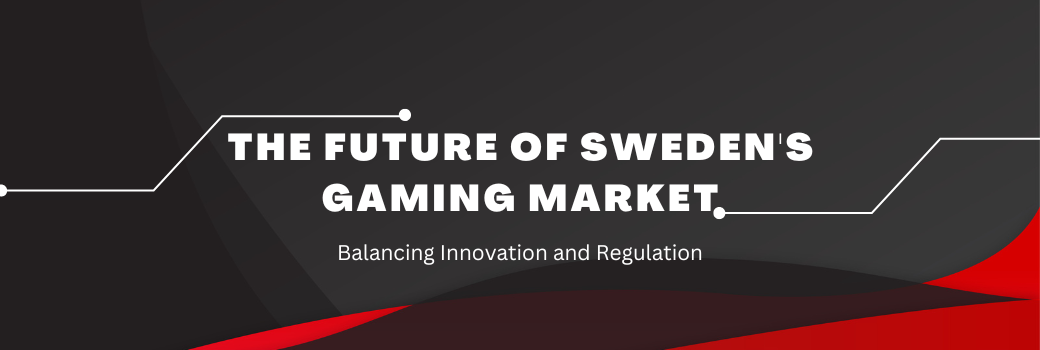The Future of Sweden’s Gaming Market: Balancing Innovation and Regulation

Sweden’s gaming market has been rapidly growing over the years, thanks to a liberalised and regulated framework that promotes innovation and competition. However, this growth has also come with a challenge: the rise of unlicensed casinos.
Unlicensed casinos are online gambling sites that operate outside the regulatory framework set by the Swedish Gambling Authority (SGA). They often offer attractive bonuses and games, which can be appealing to players who are looking for more options beyond what licensed operators offer.
However, unlicensed casinos are also a threat to player safety and the integrity of the Swedish gaming market. They may not follow responsible gambling practices, expose players to financial risks, and potentially support criminal activities like money laundering.
Balancing Innovation and Regulation in the Swedish Gaming Market
Sweden’s gaming market has a reputation for being innovative and competitive, but it also needs to ensure that it operates within a regulated framework that protects players and promotes fair competition. The challenge is how to balance innovation and regulation, particularly in the face of unlicensed casinos.
One way to address this challenge is to create a regulatory framework that is flexible enough to accommodate innovation and competition, but also robust enough to prevent unlicensed casinos from operating. The SGA has been working on this issue, but there is still more work to be done.
Another approach is to promote a culture of responsible gambling among players and operators. This can include measures like promoting awareness of gambling risks, offering resources for problem gambling, and requiring operators to follow responsible gambling practices.
The Future of the Swedish Gaming Market
The Swedish gaming market is at a critical juncture, and the future will depend on how it balances innovation and regulation. There are several possible scenarios, each with its own opportunities and challenges.
Scenario 1: More Regulation, Less Innovation
One scenario is that the Swedish gaming market becomes overly regulated, which can stifle innovation and competitiveness. This may occur if the SGA places too many restrictions on licensed operators, making it difficult for them to offer new and exciting games. This scenario could lead to players turning to unlicensed casinos that offer more options.
Scenario 2: Less Regulation, More Innovation
Another scenario is that the Swedish gaming market becomes less regulated, which can create more opportunities for innovation and competitiveness. This may occur if the SGA loosens its regulatory framework, allowing operators to offer more games and bonuses. This scenario could lead to increased player satisfaction, but also increase the risk of unlicensed casinos operating.
Scenario 3: Balance Between Regulation and Innovation
A third scenario is that the Swedish gaming market finds a balance between regulation and innovation. This scenario involves the SGA working with licensed operators to promote responsible gambling and innovation, while also preventing unlicensed casinos from operating. This scenario could lead to a vibrant and competitive gaming market that is also safe for players.
Conclusion
The future of the Swedish gaming market depends on how it balances innovation and regulation in the face of unlicensed casinos. While there are challenges, there are also opportunities to create a gaming market that is both innovative and safe for players. The SGA, licensed operators, and players all have a role to play in achieving this goal. By working together, they can ensure that the Swedish non-licensed gaming market remains a leader in innovation and competition, while also protecting players from the risks associated with unlicensed casinos.
To achieve this goal, the SGA can continue to work on creating a regulatory framework that promotes innovation and competition, while also ensuring that operators follow responsible gambling practices. This can include measures like imposing strict requirements for license holders and monitoring the activities of operators to prevent unlicensed casinos from operating.
Licensed operators can also play a vital role in promoting responsible gambling and innovation in the Swedish gaming market. They can do this by developing new games and services that meet the needs and expectations of players while also adhering to responsible gambling practices. Operators can also collaborate with the SGA to develop and implement new regulations that ensure a safe and fair gaming environment for all players.
Players can also contribute to the future of the Swedish gaming market by choosing licensed operators over unlicensed ones. This can help to create a level playing field for licensed operators and discourage unlicensed casinos from operating in the market. Players can also promote responsible gambling practices by taking advantage of the resources provided by licensed operators and the SGA, such as self-exclusion and deposit limits.
In conclusion, the future of the Swedish gaming market depends on how it balances innovation and regulation in the fight against unlicensed casinos. While there are challenges, there are also opportunities to create a gaming market that is both innovative and safe for players. By working together, the SGA, licensed operators, and players can ensure that the Swedish gaming market remains a leader in innovation and competition, while also protecting players from the risks associated with unlicensed casinos.
